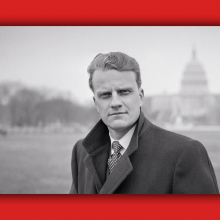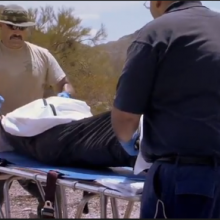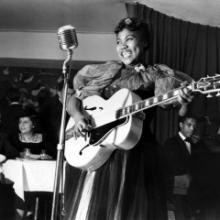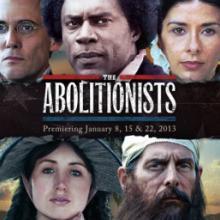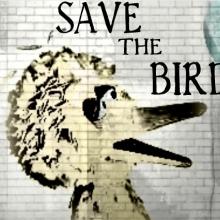PBS
THE TWO-HOUR PBS documentary Billy Graham ran as part of the “American Experience” series, but it could have been subtitled “An American Tragedy.”
The story Billy Graham tells is mostly one of triumph. A boy grows up on a North Carolina dairy farm, becomes the top Fuller Brush salesman in a two-state territory, then answers a call to preach. His crusades attract more than 200 million people and change hundreds of thousands of lives. However, like all the tragic heroes before him, Billy Graham had a flaw. It was neither lust nor greed, the nemeses of so many evangelists. Instead, as one of the commentators in the documentary tells us, Graham was drawn to power “like a moth to a flame.”
In the 1940s Graham led a movement that dragged evangelical Christianity out of the cultural backwoods and into the mainstream of postwar American life. Graham’s early years provide a road map of that movement as he went from ultra-sectarian Bob Jones University to Florida Bible Institute to Wheaton College. He worked as a staff preacher with Youth for Christ, then began a series of independent evangelistic crusades that started in a tent off Hollywood Boulevard in 1949 and culminated, in 1957, with a 16-week run at Madison Square Garden.
A Shared History
Based on Andrea Levy’s novel of the same name, The Long Song depicts a young woman coming of age in Jamaica, anticipating the imminent end to slavery and her servitude. The series displays Britain’s colonial history with the island and crafts a gripping rendering of survival, insurgence, and joy. PBS.
Radical Repair
Decolonizing Discipline: Children, Corporal Punishment, Christian Theologies, and Reconciliation presents practices from Indigenous experts to repair the harm children have endured due to colonial legacies. Edited by Valerie E. Michaelson and Joan E. Durrant, this practical book reimagines raising children. University of Manitoba Press.
IN MY YEARS of writing this column, the politics and culture of U.S. public broadcasting has been a topic in regular rotation. During Democratic administrations, I’ve tended to bash both the Public Broadcasting Service and National Public Radio for elitism, timidity, and pro-corporate bias.
But during Republican administrations it’s always seemed necessary to defend the very existence of a nonprofit, public-interest alternative in the vast, depressing, and sometimes dangerous strip mall that is U.S. commercial media.
These days the timidity of U.S. public broadcasting is still in evidence. For instance, NPR has steadfastly refused to join other prestigious media outlets in calling Donald Trump’s patent deliberate falsehoods by the appropriate four-letter Anglo-Saxon word: “Lies.” And as for elitism, take Victoria ... please!
But let’s put all that aside for now. The guard has changed again, and a new president has issued a budget blueprint that would eliminate any federal spending to support public broadcasting. So it’s time again to restate the obvious reasons why public media matter.

Image via manhhai/Flickr
At no point did I see a Niebuhrian “just war.” The entire enterprise was a moral disgrace.

Image via Ron Frank/Shutterstock.com
It would be much easier to let the face of the tomb be a scriptural story, so we could talk about terror and grief at arm’s length. But if we strip the story of humanity, we have no recourse but to fall into Christian platitudes that have no resilience in the face of real pain and grief.

Image via Journey Films / RNS
They can be found on the battlefield, at a chicken-processing plant, and behind the locked gates of a prison.
They are chaplains, and as a two-hour, two-part documentary airing on PBS stations beginning Nov. 3 points out, they minister to people of all religions and none in places where they work and live.
“Their ministry really does bring them into some of the most extraordinary places where people are in crisis and need,” said Journey Films producer/director Martin Doblmeier in an interview.

Photo via YouTube / PBS Newshour
Pope Francis’ strident critique of “unbridled capitalism” has turned heads across the globe. Ahead of his upcoming visit to the United States, American politicians, religious leaders, and laypeople are eager to hear how Pope Francis thinks about economics.
Economics correspondent Paul Solman spoke with Jim Wallis and others in a segment for PBS Newshour about why the pope wants us to stop worshiping capitalism.
Jim Wallis explained how Pope Francis’ critique of capitalism matches God’s vision for the world, as well as the ministry and example of Jesus:
Sir Thomas More loses his head in this Sunday’s episode April 26 of the acclaimed PBS historical drama, Wolf Hall, which is not much of a spoiler since that’s what infamously happened to More in 1535 at the hands of King Henry VIII.
The real suspense now is whether More will also lose his halo.
Not officially, of course: Thomas More remains a Roman Catholic saint by dint of his refusal to accept Henry’s plot to have his first marriage annulled. The onetime Lord Chancellor of England also opposed Henry’s power play against the pope, which led to the establishment of the Church of England.
More was formally canonized in 1935, on the 400th anniversary of his execution.
But in these past decades the secular world was also burnishing More’s reputation by turning him into the contemporary standard-bearer of the righteous man, wielding only his conscience and religious principles against the power of the state — the Man for All Seasons, as the 1966 Academy Award-winning film (and earlier play) depicted him.
“I die His Majesty’s good servant, but God’s first,” More declares in playwright Robert Bolt’s famous line, a riff on More’s own last words.
Yet what Wolf Hall does — and the reason such an intense debate has erupted over the series — is to engage in some bold revisionism by depicting More not as a saint but as “a heresy-hunting, scrupulous prig,” as the Catholic writer George Weigel put it.
In ‘Island of Warriors,’ the second episode of the new PBS series America by the Numbers, Maria Hinojosa, executive producer and anchor of NPR’s Latino USA, examines the challenges faced by American veterans in Guam. While Guamanian residents serve in the military at three times the rate of the rest of the United States and territories, they receive the lowest per capita medical spending from the U.S. Department of Veteran Affairs. This discrepancy in resources translates to only two full-time psychiatrists for an island of as many as 16,000 veterans — 3,000 of whom are actively requesting VA medical support for psychological disorders like PTSD.
How could this be possible?
Like Puerto Rico, Guam is a U.S. territory. While residents of these territories can, and do, enlist in the American military, they cannot vote for the president who sends them into battle. Similarly, they are represented on the floor of the House of Representatives only by delegates, who have no voting power. Eddie Calvo, the Republican governor of Guam, spoke truthfully when he ventured to call Guam a “colony” of the United States.
This disenfranchised status means that residents of U.S. territories like Guam have no real standing in American democracy. They must rely on others to advocate for them. When every state could use more resources to take care of the nearly 20 percent of veterans returning from Iraq with PTSD, who’s going to stand up for Guam?
As far as geopolitical power, Guam truly is the “least of these” in American democracy. While many Americans deplore Puerto Rico’s secondary status in American political discourse, Hinojosa recalled one Guamanian saying, “We just wish we were Puerto Rico. At least then people would know where we are.”
Think about it: Do you know where Guam is? I didn’t.
He’s born poor. By age 6, he’s an orphan. Two years later, he loses his grandfather. Yet he overcomes his circumstances, develops a reputation for business integrity and progressive views on marriage.
Then he becomes a prophet of God.
The portrait of the Muslim prophet, which emerges from a PBS documentary “Life of Muhammad,” may surprise some American viewers.
At the Full Frame Film Festival in Durham last week, I saw Marco Williams’ new documentary, The Undocumented, which tracks migrants as they hike into the United States across the border between Mexico and Arizona, trying to escape the detection of border patrol agents, and trying to survive the deadly heat of the Sonoran desert.
The documentary follows a young man, Marcos Hernandez, as he tries to find his father, Francisco, who was last seen in the desert walking for days in the 120-degree summer heat. Francisco left their home in Mexico with a coyote — man he paid $2,000 to lead him across the border — to make enough money to pay for his son’s expensive dialysis treatments. But he never called; he never returned. The coyote reported that he left Francisco in the desert because he was sick and couldn’t keep up with the other migrants in the group. Marcos fears the worst — that his father died of dehydration, of heat exhaustion. But to confirm the death he has to find the body.
The filmmaker focuses on the morgue in Tucson, Ariz., where the medical examiner investigates human remains, looking for clues that would help identify the dead in order to return whatever is left to family members and friends, to provide some kind of closure, to honor the dead with a burial.
In the film, Marcos won’t believe his dad is dead until he can see his dead body, or whatever is left of his body — a skull, teeth, his rib cage. He will not believe unless he can see.
“Unless I see the mark of the nails in his hands, and put my finger in the mark of the nails and my hand in his side, I will not believe” (John 20:25). That’s what Thomas says to the other disciples about the resurrected Jesus; and what Thomas says about needing to see the body reminds me of the story of Marcos, about the need to see in order to believe.
Before Elvis and Chuck Berry and Johnny Cash. Before Aretha and Whitney and Beyonce. Before the blues met gospel and conceived rock ‘n’ roll, there was Sister Rosetta Tharpe.
The first gospel superstar, Tharpe was a guitar hero in a flower-print dress whose bluesy chops and strutting style would be mimicked by countless acolytes, both white and black.
“I mean, she’s singing religious music, but she is singing rock ‘n’ roll,” said one such devotee, Jerry Lee Lewis, of “Great Balls of Fire” fame. “She’s hitting that guitar, playing that guitar, and she is singing. I said, ‘Whoooo. Sister Rosetta Tharpe!’”
Though no longer a household name, Tharpe gets the star treatment in a new documentary for the PBS series American Masters. Sister Rosetta Tharpe: The Godmother of Rock & Roll will be broadcast Friday on PBS in honor of Black History Month.
As the nation marks the 150th anniversary of the Emancipation Proclamation, PBS premieres “The Abolitionists,” a three-part series, on Tuesday.
Documentarian Rob Rapley, the writer and director of the series, talked with Religion News Service about the role religion played in the lives of the abolitionists.
The interview has been edited for length and clarity.
Last Saturday, supporters of Public Broadcasting gathered in Washington, D.C., for a march in response to Mitt Romney's now-infamous Big Bird comment, referring to his plan to cut funding for PBS. Armed with puppets and posters, the rally culiminated in speeches and puppet shows with the backdrop of the nation's Capitol building.
Editor's Note: Sojourners has launched this new blog series to help shed light on the nation's latest "religious" affiliation. Go HERE to read their stories. Or EMAIL US to share your own.
PBS Religion & Ethics Newsweekly has wrapped up its three-part new mini-series on the rise of the unaffiliated. Go HERE to read more about this week's episode.
Watch None of the Above: Religious Implications on PBS. See more from Religion & Ethics NewsWeekly.
Editor's Note: Sojourners has launched this new blog series to help shed light on the nation's latest "religious" affiliation. Go HERE to read their stories. Or EMAIL US to share your own.
PBS Religion & Ethics Newsweekly has launched a new mini-series on the rise of the unaffiliated. Go HERE to read more about this week's epidsode.
Watch None of the Above: Political Implications on PBS. See more from Religion & Ethics NewsWeekly.
PBS Religion & Ethics Newsweekly has launched a new mini-series on the rise of the unaffiliated. Go HERE to learn more.
Watch None of the Above: Who Are They? on PBS. See more from Religion & Ethics NewsWeekly.
OK, the @firedbigbird tweets have been hilarious.
And it's almost understandable that America has given so much attention to the Big Bird comments from Tuesday's debate. (@Firedbigbird had more than 31,000 Twitter followers as of late Friday afternoon.)
I mean, Romney's comment was definitely a "zinger."
We get it. It's funny. But come on.
On Thursday, Public Broadcasting System (PBS) CEO Paula Kerger talked to CNN about the issue, and she couldn't believe the iconic children's TV star has gotten this much attention either.
